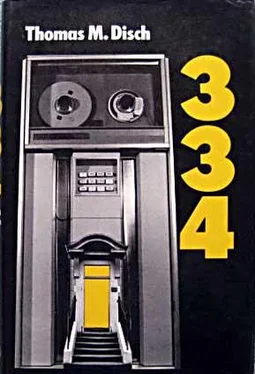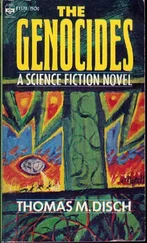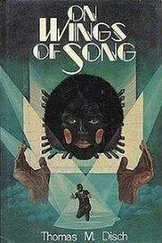He had a hard-on just from remembering. He unzipped and reached in to give it a couple half-hearted strokes but it was gone before he could get started.
He looked at his guaranteed Timex watch. Eight, on the dot. He could afford to wait two more hours. Then, if he didn’t want to pay a full fare on the subway, it was a forty-minute walk back to his dorm. If he hadn’t been on probation because of his grades, he might have waited all night long.
He sat down to study the History of Art. He stared at the picture of Socrates in the bad light. With one hand he was holding a big cup, with the other he was giving somebody the finger. He didn’t seem to be dying at all. The midterm was going to be tomorrow afternoon at two o’clock. He really had to study. He stared at the picture more intently. Why did people paint pictures anyhow? He stared until his eyes hurt.
The baby started up again, zeroing in on Central Park. Some Burmese nationals came barreling down the stairs, gibbering, and a minute later another gang of kids in black masks—U. S. guerillas—came after them, screaming obscenities.
He began to cry. He was certain, though he wouldn’t admit it yet in so many words, that Milly was cheating on him. He loved her so much and she was so beautiful. The last time he’d seen her she’d called him stupid. “You’re so stupid, Birdie Ludd,” she said, “sometimes you make me sick.” But she was so beautiful. And he loved her.
A tear fell into Socrates’s cup and he was absorbed by the cheap paper. He realized that he was crying. He hadn’t cried before in all his adult life. His heart was broken.
Birdie had not always been such a droop. Quite the opposite—he’d been friendly as a flower, easygoing, uncomplaining, and a lot of fun. He didn’t start a contest going the minute he met you, and when contests were unavoidable he knew how to be a graceful loser. The competitive factor had received little emphasis at P. S. 141 and even less at the center he was moved to after his parents’ divorce. A nice guy who got along, that was Birdie.
Then in the summer after his high school graduation, just when the thing with Milly was developing towards total seriousness, he’d been called in to Mr. Mack’s office and the bottom had dropped out of his life. Norman Mack was a thin, balding, middle-aged man with a paunch and a Jewish nose, though whether or not he was Jewish Birdie could only guess. His chief reason, aside from the nose, for thinking so was that at all of their counseling sessions Birdie got the feeling, which he also got with Jews, that Mr. Mack was toying with him, that his bland, professional good will was a disguise for an unbounded contempt, that all his sound advice was a snare. The pity was that Birdie could not in his very nature help but be caught in it. It was Mr. Mack’s game and had to be played by his rules.
“Sit down, Birdie.” The first rule.
Birdie had sat down, and Mr. Mack had explained that he’d received a letter from the upstate Regents Office. He handed Birdie a large gray envelope from which Birdie took out a bonanza of papers and forms, and the gist of it was—Birdie tucked the papers back inside—that Birdie had been reclassified.
“But I’ve taken the tests, Mr. Mack! Four years ago. And I passed.”
“I’ve called Albany to make certain this wasn’t the result of a crossed wire somewhere. And it wasn’t. The letter—”
“Look!” He reached for his wallet, took out his card. “Look, it says there, right in black and white—twenty-seven.”
Mr. Mack took the frayed card with a sympathetic sucking of his cheeks. “Well, Birdie, I’m sorry to say that your new card says twenty-four.”
“One point? For one point you’re going to—” He couldn’t bring himself even to think of what it was they were going to do. “Oh, Mr. Mack!”
“I know, Birdie. Believe me, I’m as sorry as you are.”
“I took their goddamn tests and I passed them.”
“As you know, Birdie, there are other factors to be weighed besides the test scores, and one of those has changed. Your father, it seems, has come down with diabetes.”
“That’s the first I’ve heard of it.”
“It’s possible that your father doesn’t know himself yet. The hospitals have an automatic data link with the Regents system, which in turn mailed you that letter automatically.”
“But what does my father have to do with anything?”
Over the years Birdie’s relationship with his father had been whittled down to a voice on the phone on holidays and a perfunctory visit to the federal flophouse on 16th Street an average of four times a year, on which occasions Mr. Ludd would be issued meal vouchers for an outside restaurant. Family life was the single greatest cohesive force in any society, and so, willy-nilly, the MODICUM people tried to keep families together, even families as tenuous as one father and one son eating lasagna at twelve-week intervals at The Sicilian Vespers. His father? Birdie almost had to laugh.
Mr. Mack explained first of all that there was nothing to be ashamed of. A full 2 1/2 per cent of the population scored under 25, or over twelve million people. A low score didn’t make Birdie a freak, it didn’t debar him from any of his civil rights, it only meant, as of course he knew, that he would not be allowed to father children, either directly, through marriage, or indirectly, by artificial insemination. He wanted to make certain that Birdie understood this. Did Birdie understand this?
Yes. He did.
Brightening, Mr. Mack pointed out that it was still quite possible—probable even, considering he was right on the borderline—to be reclassified again: up. Patiently, point by point, he went over with Birdie the components of his Regents score, indicating the ways he could hope to add to his score as well as the ways he couldn’t.
Diabetes was a hereditary disease. Treatment was costly and could continue for years. The original proposers of the Act had wanted to put diabetes on a par with hemophilia and the XYY gene. That was rather Draconian but surely Birdie could understand why a genetic drift towards diabetes had to be discouraged.
Surely. He could.
Then there was the other unfortunate matter concerning his father—that, during the past decade, he had been actively employed less than 50 per cent of the time. At first sight it might seem unfair to penalize Birdie for his father’s carefree life-style, but statistics showed this trait tended to be quite as heritable as, say, intelligence.
The old antithesis of heredity versus environment! But before Birdie protested too strongly he should look at the next item on his sheet. Mr. Mack tapped it with his pencil. Now here was a curious illustration of history at work. The Revised Genetics Testing Act had finally gone through the Senate in 2011 as a result of the so-called Jim Crow Compromise, and here was that compromise virtually breathing down Birdie’s neck, for the five points he’d lost through his father’s unemployment pattern he’d gained back by being a Negro!
On the physical scale Birdie had scored 9, which placed him at the modal point, or peak, of the normal curve. Mr. Mack made a little joke at his own expense concerning the score he would probably have got on the physical scale. Birdie could ask for a new physical but it was rare that anyone’s score on this scale went up, while only too often it sank. For instance, in Birdie’s case, the least tendency towards hypoglycemia might now, in view of his father’s diabetes, drop him altogether out of reach of the cutoff point.
Didn’t it seem best, then, to leave well enough alone?
It did seem best.
Mr. Mack could feel more hopeful about the other two tests, the Stanford-Binet (Short Form) and the Skinner-Waxman Scale. Birdie had not done badly on these (7 and 6), but he had not done very well either. People often improved dramatically a second time around. A headache, anxiety, even indifference—there are so many things that can get in the way of a top mental performance. Four years was a long time, but did Birdie have any reason to believe he hadn’t done as well as he might have?
Читать дальше












